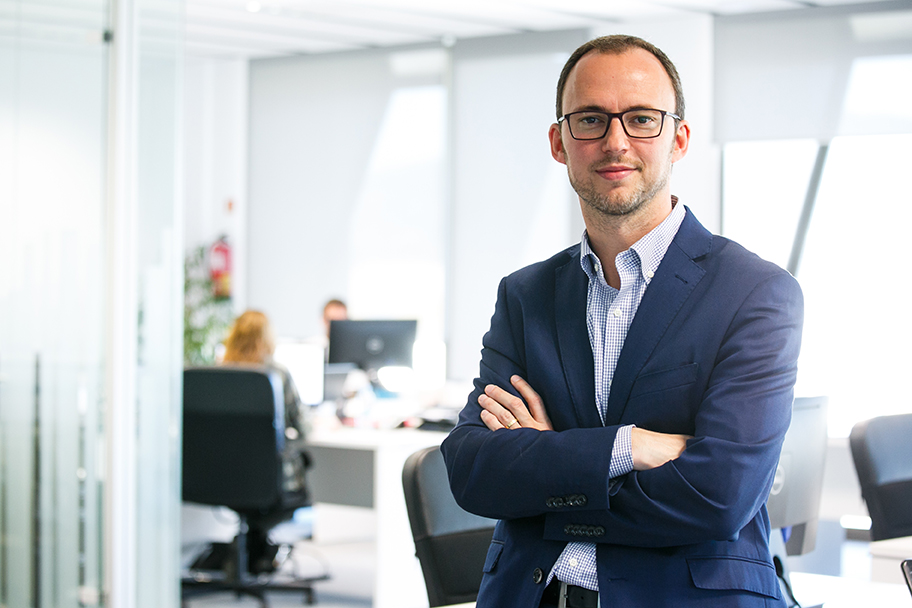The Spanish start-up Minoryx Therapeutics recently opened a subsidiary in Belgium to further their research on treatments for rare and orphan diseases. Co-founder and CEO Marc Martinell spoke to BioVox about his personal reasons for founding the company and why Belgium is such an attractive location to start-ups in the medical sector.
By Amy LeBlanc. Image: Marc Martinell, co-founder and CEO of Minoryx Therapeutics
Barcelona-based Minoryx Therapeutics was co-founded by Marc Martinell in 2011 to develop new therapies for rare CNS diseases. To-date, the company has focused their efforts on clinical trials assessing the effect of their lead compound MIN-102 on X-linked Adrenoleukodystrophy (X-ALD), a rare genetic disease without a cure.
Currently undergoing a phase II/III trial for X-ALD, Minoryx has just announced that they will expand the use of MIN-102 with a phase II trial planned to assess its effect on another neurodegenerative disease: Friedreich’s Ataxia. The news comes shortly following the company’s announcement of the opening of their first overseas subsidiary in Belgium. We spoke to CEO Marc Martinell about his personal motivation for starting the company and why Minoryx decided to move to Brussels South Biopark.
Why focus on rare diseases?
Rare diseases is an area where there is clearly a high unmet medical need. Instead of keeping my job in oncology… I decided to move into a space where there was much less work ongoing. To try to make a difference. – Marc Martinell, Minoryx
Minoryx’s lead candidate MIN-102 is a selective PPAR gamma agonist that seems capable of halting neural degeneration. In the case of X-ALD, neurodegeneration is caused by mutations on the ABCD1 gene. The two forms of the disease, Childhood cerebral ALD (cALD) and Adrenomyeloneuropathy (AMN), are both terminal. Though the disease occurs in as many as 1 out of every 17,000 children, there are currently no treatments available other than highly invasive bone marrow transplants.
The new indication, Friedreich’s Ataxia, is similarly rare and deadly. The disease typically results in loss of mobility within 10-15 years and inevitably death. Both X-ALD and Friedreich’s Ataxia are currently regarded as orphan diseases, with little attention being given to research and development of treatments. Martinell explains why he decided to dedicate his company to the pursuit of such orphan diseases:
“I had a personal experience that triggered my interest in the orphan diseases space: someone close to me was affected by a rare disease. There were actually three factors that prompted me to build this company. Firstly, I always had a quite entrepreneurial predisposition. The second, triggering factor, was my personal experience in 2009. That same year there was also a serendipitous occurrence that convinced me to pursue this idea: in Barcelona there is an annual TV program dedicated to raising funds for specific diseases. That year, back in 2009, the show was dedicated to rare and orphan diseases.
When you see so many similar personal stories, you realize that this is an area where there is clearly a high unmet medical need. Instead of keeping my job in oncology, where there were hundreds of companies working towards solutions, I decided to move into a space where there was much less work ongoing. To try to make a difference. That day I made the decision to quit my job in oncology and create a company in the rare diseases space.”
Barcelona to Belgium
There are several reasons we chose to open a branch in Belgium… Belgium has an excellent track record for growing biotechs and the talent pool is superb. – Marc Martinell, Minoryx
In January, Minoryx opened their first international subsidiary in the Brussels South Biopark in Charleroi. The site will house R&D efforts for MIN-102 and serve as a base for research into new indications for the lead compound. Martinell explained why Belgium, and Brussels South Biopark specifically, were chosen to host their new base:
“There are several reasons we chose to open a branch in Belgium. We are a company from Barcelona, where the biotech sector is growing quite a lot. So, when thinking of next steps and growing the company, a presence in another region that is also very rich in terms of biotech made sense. Belgium has an excellent track record for growing biotechs and the talent pool is superb.
We also have previously established links with Belgian investors that influenced the move. Investment is of course key for the growth of Minoryx, so we decided to open a site at the iTech incubator at Brussels South Biopark as it allowed us to be near our investors. We got an extremely warm reception from them; they helped us a lot with the move, not just to the incubator specifically but they also helped us to understand how things worked in Belgium, to find the right connections etc. It was very important for us.
We are now looking forward to working with our partners in Belgium to bring help to those suffering from rare and orphan diseases without a cure.”


